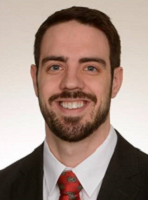Member Spotlight: Jeff Kleinberger
 1. Name and affiliation:
1. Name and affiliation:
Jeff Kleinberger, MD, PhD
University of Pittsburgh Medical Center
2. What is your professional title?
AP/CP Pathology Resident
3. How did you decide to enter the field/what (or who) brought you into the field?
I decided to enter the field of pathology during the PhD portion of my dual degree (MD/PhD) training. I enjoyed the direct clinical relationship between next-generation sequencing and the patient treatment options in my thesis work. I wanted to find a field that incorporated both of those aspects, and Molecular Genetic Pathology was a perfect fit. I pursued an AP/CP Pathology training program to build a foundation of knowledge both for interpretation of surgical specimens as well as the aspects of laboratory management.
4.What do you do? How would you describe your role?
Currently, I am a Pathology Resident at UPMC. I rotate between the many different Centers of Excellence in Anatomic Pathology as well as different clinical laboratories at UPMC. My role is to assume the position of the on-service pathologist for each of the benches, which includes carrying most, if not all, of the case load under the supervision of an attending pathologist. My goal is to pursue a fellowship in Molecular Genetic Pathology, so I try to focus on the molecular aspect of each service and how it would interconnect with the field of Molecular Genetic Pathology.
5. What degree(s) and/or training did you receive to achieve your position?
I trained in the Medical Scientist Training Program (MD/PhD) at the University of Maryland. My PhD training was in the Genome Biology Track of the Molecular Medicine Program of the Graduate Program in Life Sciences. Prior to that, I studied Biochemistry at Juniata College (PA) and performed research focused on beta cell biology in a basic science laboratory.
6. What is the greatest challenge you face in your work?
My greatest challenge is attempting to understand the diagnostic aspects, clinical implications, and molecular relationships across each of the many fields of pathology. The body of knowledge in each specific field of pathology, and especially Molecular Genetic Pathology, is rapidly growing, and it can be difficult to gain a deep understanding of all aspects of each field during our short time on each rotation.
7. What is the best part of your work as you see it? (most interesting, most fun…)
I really enjoy the balance between time spent working on cases and the time interacting with others. We have many conferences for discussing cases or learning about specific topics in pathology. I enjoy being able to discuss my ideas about cases with other pathologists, to get their opinions, and arrive at the correct diagnosis. Since so many conferences are relevant to pathology, I feel that most interdisciplinary conferences allow me to gain a better understanding of a disease or build important relationships.
8. Optional follow up question - what do you do for fun?
I have two young sons (a 1 year-old and a 2-year-old), and I love spending time with them and my wife. It has been amazing to watch them grow and discover the world, and I could not imagine doing it without someone as amazing and supportive as my wife. I also like to follow sports, such as basketball, football, and baseball, and I try to play sports when I can.






















